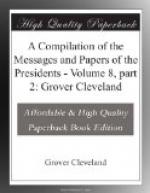I transmit herewith to the Senate, for consideration with a view to ratification, a convention concluded on the 29th of July, 1882, between the United States and Mexico, providing for an international boundary survey to relocate the existing frontier line between the two countries west of the Rio Grande.
CHESTER A. ARTHUR.
OFFICE OF THE PRESIDENT OF THE UNITED STATES,
Washington, August 4, 1882.
To the Senate of the United States:
In reply to a resolution of the Senate passed April 25, 1882, I transmit herewith a communication, with accompanying papers, from the Secretary of the Navy, in relation to the title by which the United States holds the land now occupied as a navy-yard at Boston, Mass.
CHESTER A. ARTHUR.
EXECUTIVE MANSION, August 5, 1882.
To the House of Representatives:
I transmit herewith a report of the Secretary of State, submitted in compliance with the resolution of the House of Representatives of the 28th of June, calling for additional information respecting the case of American citizens under arrest in Ireland.
CHESTER A. ARTHUR.
EXECUTIVE MANSION, Washington, August 7, 1882.
To the Senate of the United States:
I transmit herewith to the Senate, with a view to ratification, a convention concluded this day between the United States of America and His Majesty the King of Spain, supplementary to the extradition convention concluded between said countries on the 5th day of January, 1877.
CHESTER A. ARTHUR.
VETO MESSAGES.
EXECUTIVE MANSION, Washington, April 4, 1882.
To the Senate of the United States:
After careful consideration of Senate bill No. 71, entitled “An act to execute certain treaty stipulations relating to Chinese,” I herewith return it to the Senate, in which it originated, with my objections to its passage.
A nation is justified in repudiating its treaty obligations only when they are in conflict with great paramount interests. Even then all possible reasonable means for modifying or changing those obligations by mutual agreement should be exhausted before resorting to the supreme right of refusal to comply with them.
These rules have governed the United States in their past intercourse with other powers as one of the family of nations. I am persuaded that if Congress can feel that this act violates the faith of the nation as pledged to China it will concur with me in rejecting this particular mode of regulating Chinese immigration, and will endeavor to find another which shall meet the expectations of the people of the United States without coming in conflict with the rights of China.
The present treaty relations between that power and the United States spring from an antagonism which arose between our paramount domestic interests and our previous relations.




